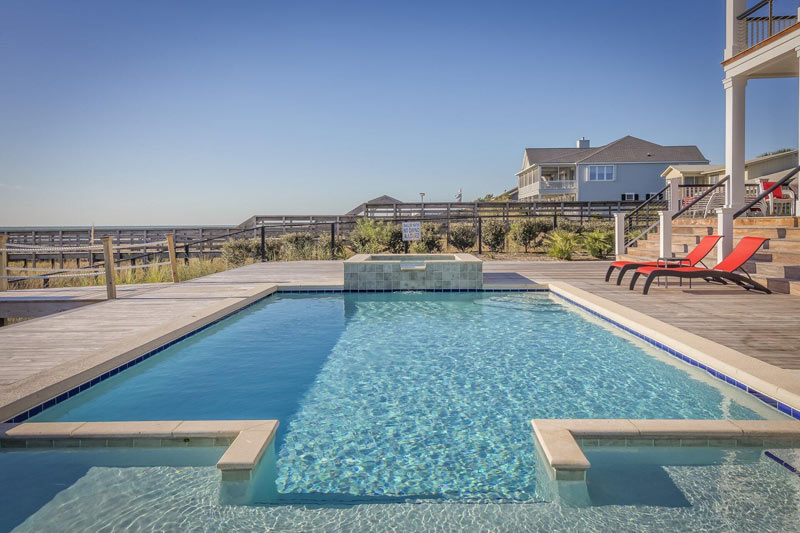Pool Plaster Types for Resurfacing Inground Pool
Are you tired of the same old look of your inground pool? Do you want to give it a fresh new look that will not only enhance its aesthetic appeal but also increase its durability and functionality? Look no further because this is the ultimate guide for your pool remodel! In this comprehensive post, we will dive into the world of pool plaster types and provide you with all the essential information you need to know in order to resurface your inground pool.
From traditional plaster to modern options like pebble and quartz, we will discuss the pros and cons of each type, as well as their unique features and maintenance requirements. Get ready to explore the endless possibilities and make an informed decision to transform your pool into a stunning oasis.
So, grab your sunscreen, and let’s dive in!
Understanding the Importance of Pool Plaster Types
Pool plaster is not just about aesthetics; it also plays a crucial role in protecting the structural integrity of your pool. When considering different types of pool plaster for resurfacing your inground pool, it’s essential to understand how each option can impact the overall look, feel, and maintenance requirements of your pool.
Classic White Pool Plaster
Classic white pool plaster remains a timeless choice for many homeowners due to its simplicity and versatility. While it can provide a clean and traditional finish to your pool, it is worth noting that white plaster may show imperfections more prominently than colored alternatives. Additionally, white plaster tends to be more susceptible to staining from chemicals, minerals, and debris, requiring regular cleaning and maintenance to preserve its appearance.
Pebble Pool Plaster
On the other hand, pebble pool plaster offers a more durable and textured finish compared to traditional white plaster. The incorporation of small pebbles in the plaster mix not only enhances the aesthetics of the pool by adding depth and character but also improves traction and slip resistance. Pebble finishes are known for their longevity and resistance to etching and chemical imbalances, making them a suitable choice for high-traffic pools or those exposed to harsh weather conditions.
Quartz Pool Plaster
Quartz pool plaster takes luxury to the next level with its sparkling and elegant appearance. The inclusion of quartz crystals in the plaster mix creates a shimmering effect that can transform an ordinary pool into a sophisticated oasis. Beyond its visual appeal, quartz plaster is highly resistant to chemical fading, staining, and erosion, making it a durable and low-maintenance option for homeowners looking for a premium finish that will stand the test of time. While the initial cost of quartz plaster may be higher than other options, its long-term benefits often outweigh the investment.
Aggregate Pool Plaster
Aggregate pool plaster offers versatility and customization for homeowners seeking a unique pool finish. By incorporating exposed aggregates such as pebbles, glass beads, or stones into the plaster mix, this finish creates a textured and visually appealing surface that can enhance the overall aesthetic of your pool. In addition to its customizable design options, aggregate plaster is durable, slip-resistant, and can withstand heavy foot traffic, making it a practical choice for both residential and commercial pool environments.
In summary, the type of pool plaster you choose for resurfacing your inground pool should align with your preferences, budget, and maintenance expectations. Whether you prioritize durability, aesthetics, or customization, each plaster type has its own unique features and benefits to consider. By selecting the right pool plaster for your pool renovation project, you can ensure a beautiful, functional, and long-lasting finish that enhances your outdoor space for years to come.
Pool Maintenance Tips
Proper pool maintenance is crucial for ensuring a safe and enjoyable swimming experience while prolonging the life of your pool equipment. Here are some essential pool maintenance tips to keep your pool clean and functional:
- Regular Cleaning: Skim the pool’s surface daily to remove leaves, insects, and debris. Use a pool vacuum or robotic cleaner to clean the pool floor and walls weekly. Brushing the walls and tiles helps prevent algae buildup and keeps the pool looking clean.
- Maintain Optimal Water Chemistry: Test the pool water regularly using a test kit or strips to check pH levels, chlorine or bromine levels, alkalinity, and calcium hardness. Balance these parameters according to recommended levels to prevent bacteria growth, algae blooms, and equipment corrosion.
- Shock the Pool: Regularly shock the pool with a chlorine shock treatment to eliminate contaminants, algae, and bacteria. Follow manufacturer instructions for dosage and frequency based on pool usage and environmental factors.
- Check and Clean Filters: Clean or replace pool filters as needed to ensure proper filtration and water circulation. Clogged filters reduce filtration efficiency and can lead to cloudy water and poor water quality.
- Monitor Water Level: Maintain the correct water level in the pool. Too high or too low water levels can affect skimmer performance, circulation, and chemical distribution. Adjust the water level as needed to keep it at the optimal level.
- Inspect and Maintain Equipment: Regularly inspect and maintain pool equipment such as pumps, motors, heaters, and lights. Clean skimmer baskets, pump baskets, and filters to prevent clogs and maintain equipment efficiency.
- Winterize the Pool: If you live in an area with cold winters, winterize your pool to protect it from freezing temperatures. Lower the water level, add winter chemicals, and cover the pool securely to prevent damage from ice and snow.
- Safety Measures: Install and maintain safety equipment such as pool covers, alarms, and fences to prevent accidents and unauthorized access, especially for households with children or pets.
- Professional Inspections: Schedule regular professional inspections and maintenance checks for your pool equipment, plumbing, and electrical systems. Professional services can identify potential issues early and ensure optimal pool performance.
By following these pool maintenance tips, you can keep your pool clean, safe, and enjoyable for swimming throughout the season. Regular maintenance helps prevent costly repairs and extends the lifespan of your pool and equipment.
Find a Reputable Pool Service
In conclusion, choosing the right pool plaster for your inground pool resurfacing project is crucial for both its aesthetic appeal and durability. From traditional white plaster to more modern options like pebble and glass beads, there are plenty of options to suit your needs. Remember to consult with a professional and consider maintenance and longevity when making your decision.
Don’t wait any longer; visit our site and give your pool a fresh look with the perfect plaster choice today.








